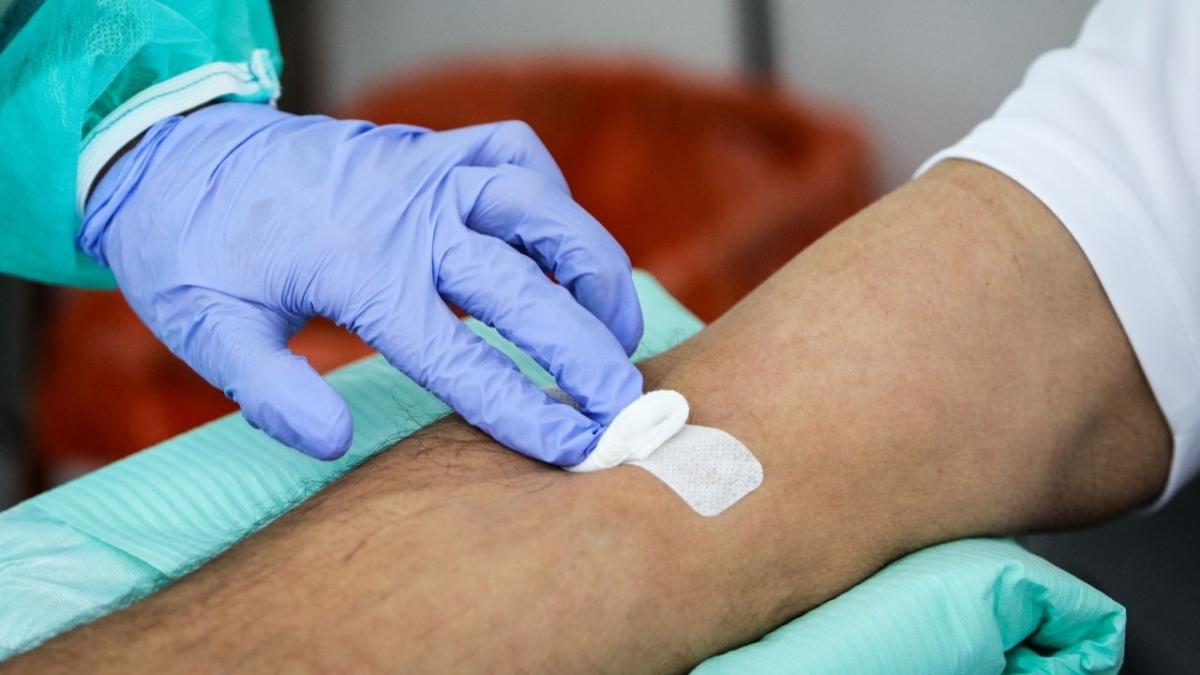
Late last year, changes were made to laws that prevented queer men from donating blood if they had engaged in sex with another man. Instead of needing to wait 12 months in celibacy, the abstinence requirement was shorted to three. However, queer men who are on the HIV prevention drug PrEP are still asked to go an entire year without the medication before they can donate.
Daniel Cottier, a 27-year-old director and producer from NSW who campaigned for the 12-month waiting period to be reduced, decided to abstain from sex for three months in order to donate.
The only thing that was in his way now was a three-month celibacy period, and everything would be in the all-clear to donate.
“I remember going to the local bloodmobile that would pull up outside our little town hall with my Mum as a kid and watching her squeeze the little red stress ball as the bag next to her filled with blood,” Cottier told PEDESTRIAN.TV.
“I think seeing that made me really want to donate when I could, so when I was old enough I did for as long as I could.”
Cottier has the blood type O-, a type that is considered extremely common, but can only receive donations from other people with O-, making it incredibly in demand.
And so, Cottier waited out his three months, making sure every necessary check was made to ensure there would be no hindrances. He returned a negative STI check, and even called the Lifeblood hotline to check his eligibility to donate blood as a queer man on Pre-Exposure Prophylaxis (PrEP), an antiretroviral drug that is highly effective in preventing HIV. Cottier was assured that everything would be perfectly fine.
“I walked down to Lifeblood Town Hall Donor Centre. I’d had my 10 glasses of water the day before, my savoury item for breakfast and I was ready to give over a big bag of O- for the first time in a decade,” he said.
“I was chatting to the nurse about how excited I was to be able to give blood after sending off emails and trying to use my free time during COVID to do something useful and lessen the deferral period from 12 months to 3 months for gay men.
“She was very kind and excited that I’d be able to donate. She looked at the survey and said, ‘You’ve answered yes to the question about taking PrEP?’ I confirmed that and her face changed.
“‘I can’t donate, can I?’
“She told me that, unfortunately, I would be ineligible until I had 12 months without taking PrEP. I was devastated and started crying as she spoke very kindly about how she felt it was a silly rule but it was the rule none the less.”
Cottier phoned the complaints line after receiving an Instagram response from Lifeblood. Unfortunately, the phonecall left him even more disparaged at the lack of education around matters intrinsic to the LGBTQ+ community.
“When I phoned the complaints line, the operator told me she wasn’t sure what PrEP was,” said Cottier.
“She tried to point me in the direction of the latest findings about deferral periods, but when she and I looked the last update was 2012.”
Deferral periods for gay men who engage in sex with other men have been around since the 1980s, when AIDS-era restrictions came into place.
In many ways, modern-day waiting periods specific to gay and bisexual men are hang-ups from that time, and stereotype people based on their sexuality rather than their individual potential risk.
For years, sex has not been seen as equal between heterosexual and homosexual individuals within the sphere of blood donations due to fear. It’s a discriminatory practice that has only relented (somewhat) within the last year or so in Australia, and we still haven’t even achieved complete inclusion.
A three-month waiting window is still discriminatory, as it measures up gay sex as somehow more dangerous than straight sex. This was a misconception prominent in the past, and it has no place in the 2020s.
However, reducing waiting periods isn’t as simple as Lifeblood Australia changing the rules. It’s actually a change that needs to go through federal and state parliaments after a recommendation from the Therapeutic Goods Administration (TGA). This is a process that can take years and cost millions of dollars.
Lifeblood told P.TV it made a submission to the TGA around PrEP at the same time as its submission for men who have sex with men, but that the PreP submission was yet to be reviewed.
According to Lifeblood, the reason PrEP users must still endure a 12-month waiting window is because the medication impacts the ability for tests to pick up HIV infection. Research is taking place at the moment to discover whether or not PrEP bears any risk to the donated blood pool, and a submission from Lifeblood recommending a reduced deferral period is being considered by the TGA.
“We’re very sorry for any confusion or hurt this lack of information may have caused to our donors and the community,” a Lifeblood spokesperson said.
“Our website does not list all reasons for asking donors to wait before donating blood because there are many of them [around 300 to be exact], and they can change, but we agree the rules around PrEP should be available.
“To prevent any future confusion, we’ve updated our website and donor communications to include the postponement guidelines for PrEP.”
Lifeblood also explained what is being done to change the deferral periods for PrEP users from 12 months to three.
“Australian Red Cross Lifeblood recently reduced the waiting period for those at a higher risk of exposure to HIV and other blood-borne infections because of sexual activity, from 12 months to three months,” Lifeblood wrote.
“Our ongoing aim is a safe and stable blood supply that is inclusive. For this reason, we are working on a similar change for PrEP. We don’t currently have a timeline however we’ll let people know as soon as the change comes into effect.
“Currently, donors taking PrEP need to wait 12 months since their last dose before donating blood. This is because PrEP impacts the ability of testing to pick up early HIV infections.”
According to Lifeblood, a submission has been made to the TGA to see the PrEP deferral period reduced to three months. This change would make way for an incredible amount of queer men to finally be able to give blood, as many are routinely on PrEP medication.
“We have made a separate submission. It has required research, both our own and looking at international research, which our team has been doing for the past few years in anticipation.”
Shortly after making its statement, Lifeblood changed its website’s information to a longer sentence with more detail, but there are fears this isn’t enough.
“Clearly, with all the recent changes that have occurred with the blood deferral, there is still some communication gaps,” said Nic Holas, activist, writer and co-founder of The Institute of Many, a peer-run movement for people living with HIV.
“It’s tricky, because the Australian Red Cross isn’t a queer organisation, and a lot of the conversations around PrEP and HIV are a bit ‘inside baseball’ – which needs to change, because general public awareness of PrEP and U=U (that the vast majority of people living with HIV in Australia pose zero risk to their partners) is really, really low.”
Holas also spoke to P.TV about the waiting game that faces queer individuals on PrEP who are looking to give blood, and are either caught by surprise by the PrEP deferral times, or find it impossible to wait an entire year.
“Sadly for those queer PrEP users who seem really intent on donating blood, it can be a long road from scientific studies to real-world change,” he said.
“We knew about undetectable viral loads in the late 90s, but it took nearly 20 years before the global scientific community was prepared to say without hesitation that there was zero risks of passing HIV on to our partners.
“PrEP is still the new kid on the block, and it will take time before we can say with confidence that PrEP presents no risk to the donated blood pool.”



